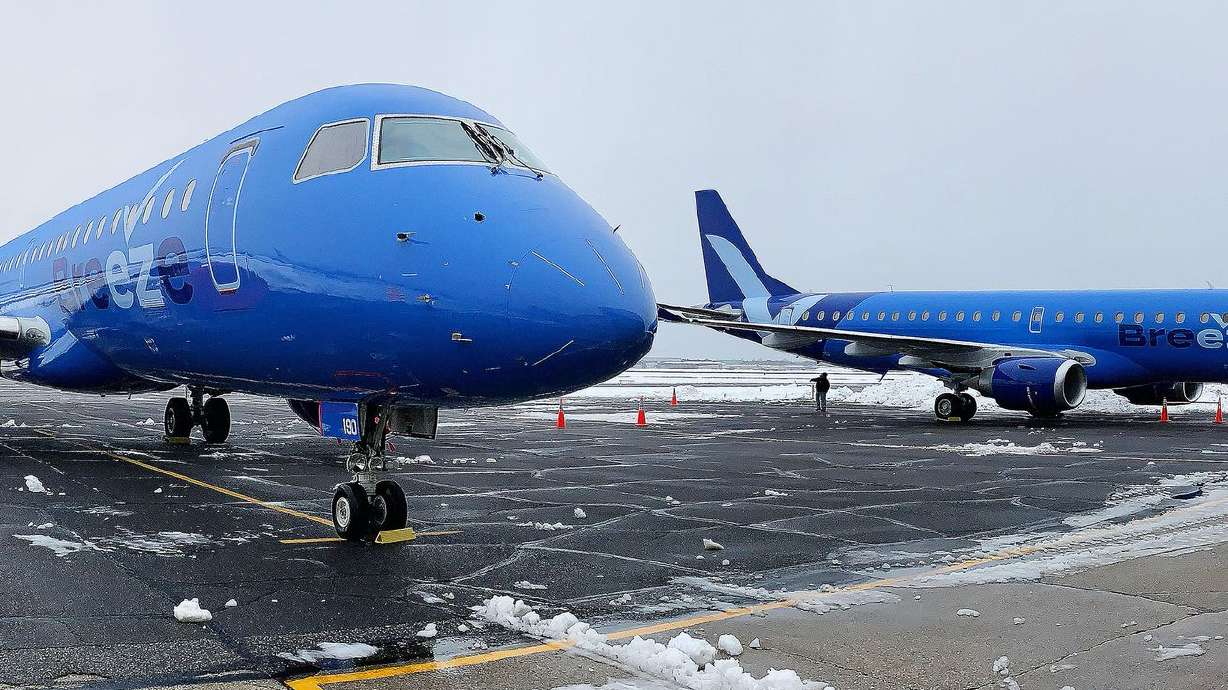Estimated read time: 3-4 minutes
This archived news story is available only for your personal, non-commercial use. Information in the story may be outdated or superseded by additional information. Reading or replaying the story in its archived form does not constitute a republication of the story.
SALT LAKE CITY — Less than three months after launching its inaugural flights, Utah's Breeze Airways on Wednesday announced closing on $200 million in fresh funding that will help fuel continued expansion for the new domestic carrier.
Salt Lake City-based Breeze reports the Series B round was led by funds and accounts managed by BlackRock and Knighthead Capital Management, with additional investments by the airline's existing investors, including Utah firms Peterson Partners and Sandlot Partners. The new round brings Breeze's total funding to $300 million, a benchmark the company says is a record for a fledgling U.S. carrier.
Breeze Airways is the latest airline startup from serial-entrepreneur David Neeleman, his fifth after previously launching onetime Utah-based provider Morris Air, JetBlue, Canada's WestJet and Brazil's Azul Airlines. Neeleman said the new funding will help expand Breeze's mission of connecting smaller U.S. airports together with new, nonstop service.
"Welcoming funds and accounts managed by BlackRock and Knighthead and additional funding from our existing investors further validates our business strategy to offer new nonstop flights at reduced fares between smaller cities where the Guest's only choice today is a lengthy connecting flight through a large hub airport," Neeleman said in a statement. "We look forward to working with our new investors, humbled to be considered the best-funded startup in U.S. aviation history, and are excited about the growth that it will fuel."
Just ahead of the start of Breeze service in May, Neeleman told the Deseret News his new airline will be focused on providing service that connects U.S. cities in secondary market airports, pushing back against a long-running industry bent toward concentrating operations and flights at select hub facilities.
And Breeze is embracing a slew of tech tools and flexibility options that, along with lower prices and a customer-centric business approach, Neeleman believes will make his newest airline venture stand out among competitors.

"Together, we created Breeze as a new airline merging technology with kindness," Neeleman said. "Breeze provides nonstop service between underserved routes across the U.S. at affordable fares.
"A staggering 95% of Breeze routes currently have no airline serving them nonstop. With seamless booking, no change or cancellation fees, up to 24-months of reusable flight credit and customized flight features delivered via a sleek and simple app, Breeze makes it easy to buy and easy to fly."
Breeze is currently providing service to 16 cities and flying 39 routes with 13 single-class, Brazilian-made Embraer aircraft. The company says it will start taking delivery of 60 new Airbus A220 aircraft in October, which will be delivered at a rate of about one per month for the next five years. The new planes, Breeze says, will be flown on routes longer than two hours' flight time.
Investor Adam Zirkin, partner at Knighthead Capital, said Breeze is poised for success in providing new and more efficient service options for customers in underserved markets.
"Breeze's use of right-sized and efficient aircraft to offer new nonstop service between smaller U.S. cities constitutes a true competitive advantage, and delivers a better experience for travelers whose only current options are connecting flights," Zirkin said in a statement. "Moreover, the airline's unique use of technology allows for better service at lower cost, eliminating the missed connections, delays, and long customer service hold times that are such an unfortunate part of air travel as we know it.
"We're excited to partner with David and the rest of the Breeze team, as they build and provide this new and improved travel experience."
Neeleman's latest startup has also earned support from state leaders, with the Governor's Office of Economic Development announcing a post-performance tax rebate package for the company in late 2019.
The package could earn Breeze as much as $1.1 million in tax rebates on plans to make over $3 million in capital investments and hire about 370 new Utah employees. At this point, Neeleman said he does not anticipate Breeze will be providing service in or out of Salt Lake City International Airport, but other Utah airports may be in the running for new routes.








